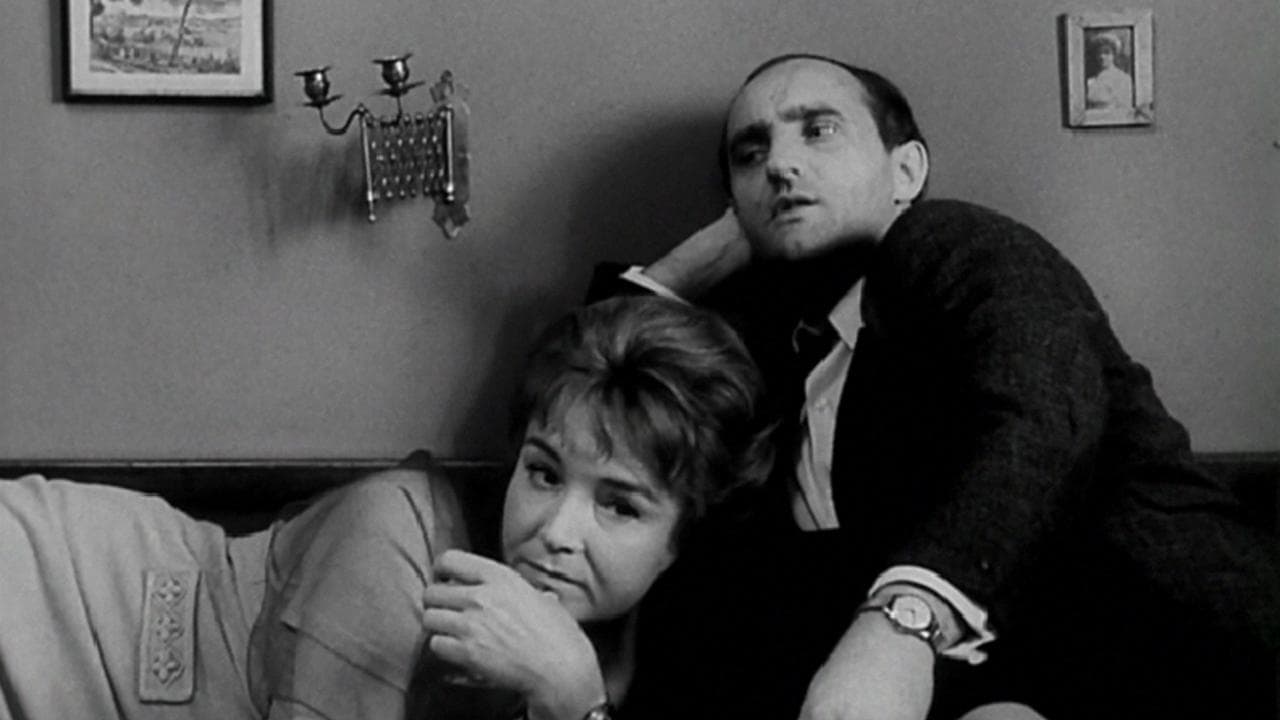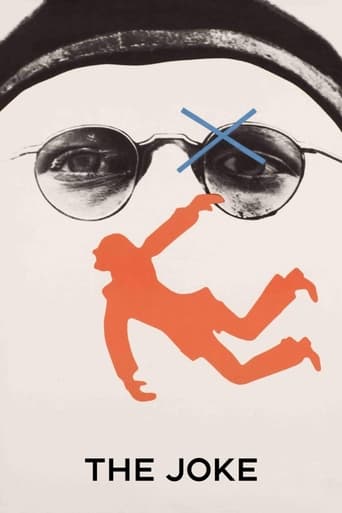



Truly Dreadful Film
An action-packed slog
Easily the biggest piece of Right wing non sense propaganda I ever saw.
View MoreGreat example of an old-fashioned, pure-at-heart escapist event movie that doesn't pretend to be anything that it's not and has boat loads of fun being its own ludicrous self.
View MoreA vehement indictment of Czech's Communist Party cropping up in the aftermath of Prague Spring and the Warsaw Pact invasion, THE JOKE is the politically engagé Jaromil Jires' sophomore feature, adapted from Milan Kundera's novel and banned immediately after its release, it has been hailed as the last keystone of Czech New Wave movement. Nevertheless, viewed as an independent art piece shorn of its erstwhile political context, it still can hold courts in terms of Jires' nifty visual and editing modality, but at the same time, is severely undermined by several unsavory blemishes, not least its blinkered misogynous treatment. In 1968, a middle-aged scientist Ludvik Jahn (Somr) returns to Prague after almost two decades and gestates a vengeance to his former college schoolmates, who have expelled him from both the college and party due to a facetious "Long Live Trotsky" postcard he sends to his sweetheart Marie (Obermaierová) to cheer her up. The joke recoils badly and Ludvik is sent to "re-education" in the military where sadistic corporeal punishment is subject to those political dissenters. In the face of the film's 20-year-apart past-and-present correlation, Jires adopts an impetuous cross- cutting technique to juxtapose those two time-frames together, often predicating upon the incidents in the present time (a celebration of newborn babies, a music rehearsal of his old band-mates etc.), which evoke Ludvik's memory of tonally diametrical situations, and subjective angle is also craftily applied to give the audience a vantage point of a haphazard-ish narrative. So, Ludvik's half-baked plan is to seduce Helena (Dítetová) ("Why don't you grow a pair?"), the wife of Pavel (Munzar), who is his former friend and treacherously betrays him in the trial of his "joke". His plan works, to our utter incredulity because Somr's Ludvik is the antithesis of his dashing counterpart in Kundera's source novel, a bald, portly, reticent type, inept in his action and disaffected in his cynical gaze, so, the reason why Helena falls for him so hard is a total myth and very much contrived, loneliness maybe, but as a successful TV anchorwoman, she is not shy of suitors, even younger, prettier ones. It is a plain pathetic male wish-fulfillment in establishing Helena as a desperate erotomaniac albeit Dítetová's willed attempts to extract some compassion out of her poorly devised character arc, and overall, the female characters are either a masochistic cougar, a priggish party devotee, or a candy-floss trophy girlfriend, no wonder Ludvik frankly admits that he prefers whores.To shame a man by sleeping with his wife, the stratagem itself is petty, malicious and misogynous to a fault, if Jires' intention is to make Ludvik a miserable reprobate, he has it on a silver platter. A trenchant reproof of an inequitable polity or a pessimistic take on an individual's ingrown corruption? THE JOKE begins as the former but ends up in close proximity of the latter, that is a letdown with a capital L.
View MoreThis film, one of the most celebrated of the Czech New Wave, is often commended as a bravely anti-communist work. I do not agree with that assessment. This film was produced by a state-run, Party controlled studio. It attracted a great audience to the state-run cinemas of the time. While it certainly details the injustices and abuses of the Stalinist era in the Eastern Bloc countries of the late '40s and early '50s, its most sympathetically portrayed character is not the once-purged-now- successful revenge-bent scientist at the center of the narrative. Rather, the most impressive character we see is the main character's rival and target: a once proud idealist who danced seductively to the traditionalist folk-hymns embraced during the enactment of Czeck socialism, and who partook in the Stalinist committees popular at the time, he now teaches Marxism to the sex-and-drugs celebrating children of the late '60s and embraces their cultural revolution. The cynical "protagonist" knows only anger over past wrongs, which is to say resentment. The commie true-believer moves forward with history and its evolving paradigms of love and joy. I would define this film as a Nietzschean, rather than as an anti-Marxist (or Marxist) work.
View MoreWhilst looking for info about the Czech New Wave (CNW) title The Cremator,I stumbled upon another "The" CNW movie that I've not heard of before.Making plans for a month of Czech film viewings,I decided that it was the perfect time to hear the joke.The plot:Returning to his hometown for the first time in years, Ludvík Jahn meets an attracted women called Helena Zemánková.As things heat up between the couple,Jahn discovers that Helena is actually married to his old enemy Pavel,which leads to Ludvik to think about the events which led to him leaving the area.Years earlier:Taken by the appearance of the beautiful (and loyal commie) Markéta,Jahn decides to find out if Markéta can take a joke by sending a satirical Trotsky postcard (!).Showing how much of a joke she can take, Markéta and Jahn's pal Pavel give the postcard over to the secret police,who send Jahn for 6 years of "re-education",which leads to Jahn in the present deciding that it is time he shares a joke with Pavel.View on the film:Banned for 20 years after coming out just after the Warsaw Pact invasion of the country took place,co-writer/(along with Zdenek Bláha & Milan Kundera) delivers a damming indictment against the Soviet Union,by jaggedly counting revolutionary songs being sung with an unflinching eye towards the dehumanisation process taking place in the "re-education" centres.Inspired by Film Noir, Jires locks the rawness of CNW with Film Noir stylisation,which allows the viewer to dig into Jahn fractured mind with extended first person tracking shots the pour out all of Jahn's hidden feelings.Adapting the novel which would lead to its writer (and co- screenwriter) Milan Kundera leaving the country a few years later,the writers brilliantly knot a Film Noir offering of hope with bitter jet-black comedic edges.Given Jahn (played by a terrific Josef Somr) a wry,cynical smile,the writers brilliantly smash the loner Jahn against people with the stubborn belief of defending their cause,no matter how minor/non-existent the issue is. Enchanting Helena (played by an alluring Jana Dítetová) to get his revenge on Pavel,the writers tear open a Film Noir vein with a venomous punchline,as Pavel shares a joke with Jahn.
View MoreKundera is one of the most enjoyable Central/East European authors of the post-war period and that is because he wrote a number of books with a very simple, and flavorful, message: we fight totalitarianism by simply not caring about it; adultery is one very good way to be a dissident. Ludvik Jahn served in a non-combatant military unit, then spent a year in a prison (without conviction) and had to work for six years in the mines (for lack of university degree) just because his colleagues and Party comrades took very seriously a stupid joke he wrote to his beloved for absolutely personal reasons. Jahn's revenge had to take the form of a joke because his major concern was namely that: how could these men take so seriously an innocent charade? Yet, his joke turned out bad: instead of humiliating Pavel, the once leader of the students' party organization, by seducing his wife, Jahn humiliated the innocent, and naive, woman, broke the heart of her young suitor and, most unfortunately, had to realize that Pavel, the allegedly serious communist, fared much better in the field of adultery: enjoying the company of 20-year old attractive students who have absolutely no notion of Marxism and the construction of socialism. It is through this realization, and not so much through his earlier ostracization, that Ludvik is confronted with the consequences of his own misplaced joke. His lonely protest against the system failed.ADDED IN 2009: now, that Kundera was revealed to have himself denounced a "capitalist spy" to the police authorities and thus contributed to the long-term prison/correction camp sentences of several people, this book/movie develops in an unexpected dimension. Was it a deliberate, or subconscious way for Kundera to deal with his own guilt, a way to explain to his younger self that what he did, apparently out of good faith and sense of civic duty, at the age of 20, seemed nothing but utter stupidity at the age of forty?
View More